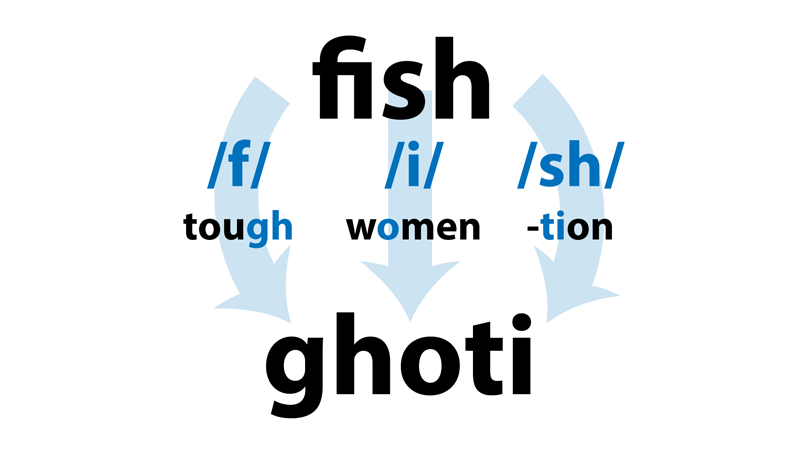New FCRR grant investigates how children internalize inconsistent letter-sound correspondences

The English language is filled with complex and incosistent letter-sound correspondences, as illustrated in the image above.
The English language is filled with complex and incosistent letter-sound correspondences, as illustrated in the image above.
Ask a child to spell the word "fish" and you probably wouldn't expect the response, "G-H-0-T-I." However, according to Dr. Don Compton, Director of the Florida Center for Reading Research at Florida State University, the spelling actually makes sense. Compton explains, “If you take the sound "gh" makes in word, "tough" add the "o" sound from the word, "women," and end with the sound "T-I" makes in the suffix, "tion," you end up with "fish." While this is certainly an extreme example it does illustrate some of the issues facing children as they learn to read English. Namely, where letters occur in a word and what letters are adjacent to these letters influence the pronunciations. For instance, as children learn to read words with the vowel grapheme ea (e.g., head and beam) they will become sensitive to the fact that the final consonant influences the vowel pronunciation such that "ea" is more likely to be pronounced as /ɛ/ (rhyming with head) when it occurs before d than when it occurs before other consonant letters. These “context-dependent” phonics constraints are at the center of a new set of studies, funded by an NICHD Learning Disabilities Innovation Hub grant, being conducted by Compton and colleagues.

FCRR researchers (left to right) Drs. Petscher, Compton, and Steacy
"The English written language is riddled with systematic, yet often inconsistent letter-sound relationships. The goal of this new Hub is to help fill in the gaps of our collective knowledge to help better understand how young readers acquire these sound-to-spelling skills. Our hope is to identify important factors that can lead to improved evidence-based instructional practices for children who struggle with learning to read."

Vowel graphemes, such as "ea," produce different sounds based on neighboring consonants.
The multidisciplinary Hub team also includes noted Florida State researchers Drs. Laura Steacy and Yaacov Petscher, as well as Drs. Kenneth Pugh and Stephen Frost from Haskins Laboratories and Dr. Jay Rueckl of the University of Connecticut.
The NICHD LD Hubs, launched in 2012, strive to address the causes, symptoms, and treatments of learning disabilities that impact reading, writing, and mathematics. The Hubs explore understudied research topics and conduct projects that study those diagnosed with and at-risk for learning disabilities.
The Florida Center for Reading Research is a multidisciplinary research center at Florida State University that explores all aspects of reading research — basic research into literacy-related skills for typically developing readers and those who struggle, studies of effective prevention and intervention, and psychometric work on formative assessment. For more information, please contact Nathan Archer at narcher@fcrr.org.

